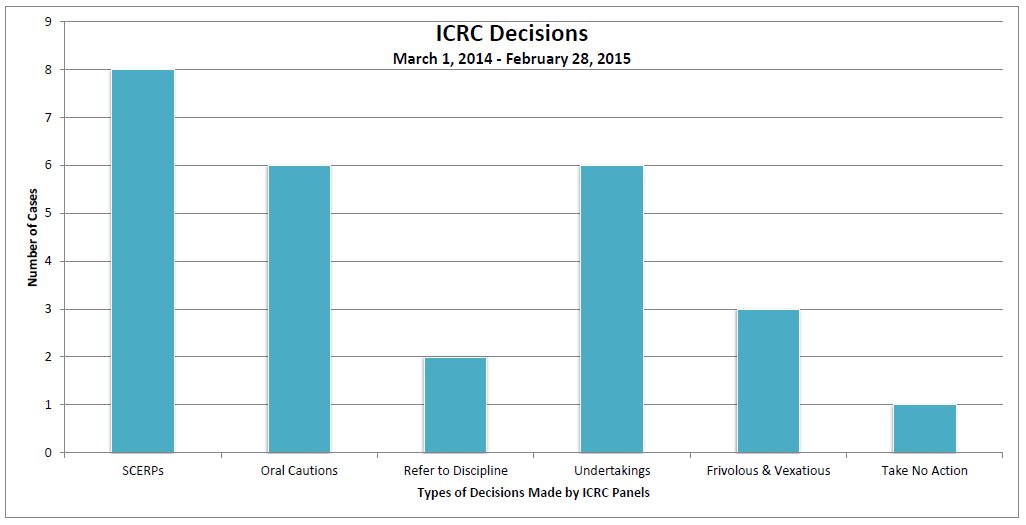You might be surprised to know that when concerns about a Member are brought to the CRTO we are often asked, “What will happen to the them? Will they lose their license?” Revoking an RT’s certificate of registration is the highest penalty that can be ordered, and is reserved for the most grievous concerns. To date, no CRTO case has required this level of discipline.
The Inquiries, Complaints and Reports Committee (ICRC) follows a rigorous process and makes decisions based on:
- The severity of the issue;
- Whether or not this is a first occurrence for the Member; and
- Can the allegations be proven?
The ICRC weighs the above criteria. They have a number of tools to address the concerns at their disposal, with their primary focus being remediation. The ICRC is in place to help Members get their conduct or practice back up to CRTO standards – and keep it there! The range of options available to the ICRC includes (listed in order from least intrusive to most):
Take No Action
Take No Action
If an RT is found to be practising to standard
For Example
The family of a patient who died following a trach tube change complains to the CRTO. Following a thorough investigation, it was determined that subcutaneous emphysema had resulted from the trach entering a false passage. The unfortunate outcome occurred despite the RT practising to standard, and is a known risk for the procedure.
Advice/Recommendations
Advice/Recommendations
Suggestions from the Committee about how to improve – no additional requirements
For Example
An RT complained that a colleague was practising while in a conflict-of-interest because he works part-time at both a hospital and his own home oxygen company, which receives out-patient referrals from the hospital. The ICRC panel recommended that the RT use a paper form to document a referred patient’s acknowledgement that they have the option of going to another home oxygen company. A list of competitors a patient can choose from should also be included on the form.
Written Caution
Written Caution
A written warning from the Committee that conduct/practice was seen to be less than ideal and that change or improvement is needed to avoid future issues – may or may not include additional requirements
For Example
An employer informed the CRTO that a letter of discipline had been given to an RT for using the hospital’s telephone to call a date/chat line during work hours. The ICRC panel cautioned the Member in writing that they took this matter very seriously and warned if similar issues were reported to the CRTO, additional action would be taken, as this becomes part of his record.
Specified Continuing Education or Remediation Program (SCERP)
Specified Continuing Education or Remediation Program (SCERP)
A variety of courses or programs may be required by the Committee to address concerns, for example: interpersonal communication, professionalism, boundaries, ethics, documentation, etc.
For Example
An RT was reported to the CRTO for destroying part of a patient record and then replacing it with a re-written version containing different information. The ICRC panel required the Member to complete remediation programs (SCERPs) on documentation and ethics.
Verbal/Oral Caution
Verbal/Oral Caution
Requires an RT to appear before the Committee to hear their feedback directly on the concerns raised
For Example
An RT was reported to the CRTO for unprofessional conduct – he raised his voice and made disparaging comments to another RT. According to the person who reported the RT, this was not the first occurrence and there were witnesses to support this claim. The panel required the Member to appear before them to receive their feedback on his behaviour.
Refer to Discipline
Refer to Discipline
Concerns are of the most serious nature (e.g., breaching an agreement with the CRTO) and there is sufficient evidence to support the allegations
For Example
An RT who had signed an Agreement with the CRTO that he would not behave unprofessionally towards colleagues was reported for similar conduct that originally instigated the Agreement. The ICRC panel determined that the RT would be referred to the Discipline Committee, since remediation had not prevented a recurrence of unprofessional behaviour.
All examples are from real cases.

